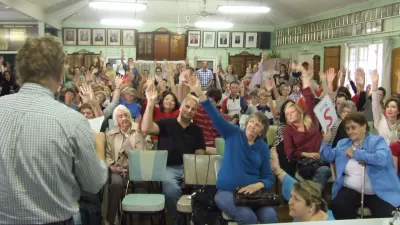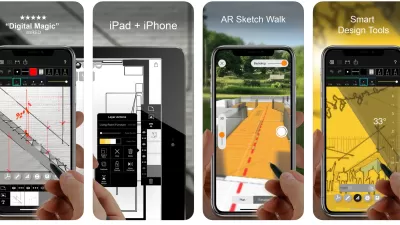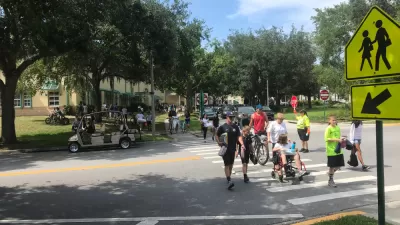The increasing use of online civic engagement platforms offers a chance for planners to improve the planning process—that is, if they take full advantage of the opportunities presented by the new technology to showcase their expertise.

Cities are experiencing significant changes, from fluctuations in population to climate change impacts and affordability concerns. However, the role of city planners in navigating cities through these changes is in flux. Over the last 30 years, planners have seen their role as the brokers of facts for implementing new initiatives diminish. Their expertise takes a backseat to time spent organizing and facilitating evening meetings.
The growth of civic engagement platforms, where residents weigh in with ideas and opinions about urban development plans, could continue this trend unless planners utilize the benefits of this technology as a platform for their expertise.
Why aren’t planners able to implement new initiatives? A significant challenge is getting political and community buy-in. To be fair, online engagement platforms cannot solve all the complex political challenges in local communities, but they can bring more transparency and accountability to the political process. Public meetings are the de facto method for collecting resident feedback for urban development projects. Because they are often held at inconvenient times, most residents are unable to participate. Bringing the information online helps more people access the information, weigh-in, and offer support for projects.
What is Online Civic Engagement?
From crowdfunding to forums, it seems like a new civic tech tool comes out every day. It can get confusing.
To collect resident feedback and start informed discussions with one of these tools, key features to look for include:
- Customizable profiles for each project
- Map-based impact visualizations
- Simple signup process
- Follow features that allow residents to stay in the loop
- Comments and weekly digests of new conversation
- Ability to "support" or "like" comments
- Ability to communicate with project followers
- Analytics to show sentiment trends in resident conversations
- Requirement that users signup with real names (this keeps conversations authentic and keeps commenters accountable)
Four Ways Online Engagement Drives Fact-Based Discussions
These features help set the stage for authentic, fact-based discussion about planning choices. Helping residents understand facts and implications can reduce misunderstanding and misinformation.
Here are four practical ways online engagement helps planners drive more informed discussions about projects.
1) Share facts and visualize project impacts.
People want to know how a project would change their neighborhood and their everyday routine. Will traffic or route alterations affect their commute to work? Will a new development cast a shadow on their home?
Being able to translate an engineering report into a visualization with an explanation, in layman’s terms, can go a long way in reducing confusion and uncertainty that comes from cumbersome, hundred-page project reports.
2) Reach a more representative audience.
Have you ever put a toddler to sleep? Well, to say young parents are slightly pre-occupied at 8 p.m. on a Tuesday is an understatement. This is just one valuable group of residents planners miss out on with public meetings. Elderly residents may not be able to stay the entire meeting period if events extend into the evening. Other residents with inflexible or unpredictable schedules and work hours may also be underrepresented at public meetings.
Online engagement helps planners gather input from all residents from the onset of the planning process. This helps planners include all of the right information during each stage of the deliberation process.
3) Educate through responses to comments and concerns.
People have a lot of ideas for improving their communities, but ultimately planners are responsible to the whole community to ensure equitable and sustainable development. Change is difficult. Helping people understand the reasons and data behind planning decisions goes a long way toward building support for new initiatives.
A civic engagement platform keeps conversations in one place, enabling planners to find and respond to individual questions. Since planners can respond in a comment thread instead of an email chain, responses will be visible to others who are interested in the same topic. This cuts down on the back and forth and helps distribute the desired messages.
4) Online engagement doesn’t replace public meetings—it helps them be more productive.
The progress made during online conversations can help set the agenda for public meetings and make them more efficient. It can also help bring more attendees.
People make time for the things that matter to them. Previously disengaged groups—college students, young professionals, young families—might find an interest in local projects and come to public meetings if we first meet them where they are: online.
Planners can invite online project participants to the public meetings. Additionally, planners can share meeting notes online so everyone is on the same page before the meeting starts.
Going Online to Build Better Communities
Together, planners and residents can collaborate to tackle the challenging issues facing cities. It’s on residents to participate, but it’s on planners to provide residents with better platforms for doing so. Urban change is difficult but bringing more transparency about what that change means for a neighborhood can alleviate concerns.
Public meetings are a great start, but public meetings alone are an outdated process that needs revamping. Adding online civic engagement into the mix might sound like more work for planners, but actually, all it takes is as little as 15 minutes a day a few times a week of logging in and responding to questions. That investment alone can do a lot for collecting better feedback and getting more prepared for public meetings.
To build better communities, we need to use better tools to make it easy for all residents to add their voice to the process. Civic engagement platforms can help planners reach a wider audience and leverage their expertise to implement change.
Karin Brandt is the CEO and Founder of coUrbanize, a civic engagement platform that helps residents, planners, and developers build better cities together. coUrbanize is a 2013 TechStars graduate and is headquartered in Cambridge, MA. Say hi to Karin on Twitter @karbrandt.

Maui's Vacation Rental Debate Turns Ugly
Verbal attacks, misinformation campaigns and fistfights plague a high-stakes debate to convert thousands of vacation rentals into long-term housing.

Planetizen Federal Action Tracker
A weekly monitor of how Trump’s orders and actions are impacting planners and planning in America.

In Urban Planning, AI Prompting Could be the New Design Thinking
Creativity has long been key to great urban design. What if we see AI as our new creative partner?

King County Supportive Housing Program Offers Hope for Unhoused Residents
The county is taking a ‘Housing First’ approach that prioritizes getting people into housing, then offering wraparound supportive services.

Researchers Use AI to Get Clearer Picture of US Housing
Analysts are using artificial intelligence to supercharge their research by allowing them to comb through data faster. Though these AI tools can be error prone, they save time and housing researchers are optimistic about the future.

Making Shared Micromobility More Inclusive
Cities and shared mobility system operators can do more to include people with disabilities in planning and operations, per a new report.
Urban Design for Planners 1: Software Tools
This six-course series explores essential urban design concepts using open source software and equips planners with the tools they need to participate fully in the urban design process.
Planning for Universal Design
Learn the tools for implementing Universal Design in planning regulations.
planning NEXT
Appalachian Highlands Housing Partners
Mpact (founded as Rail~Volution)
City of Camden Redevelopment Agency
City of Astoria
City of Portland
City of Laramie





























